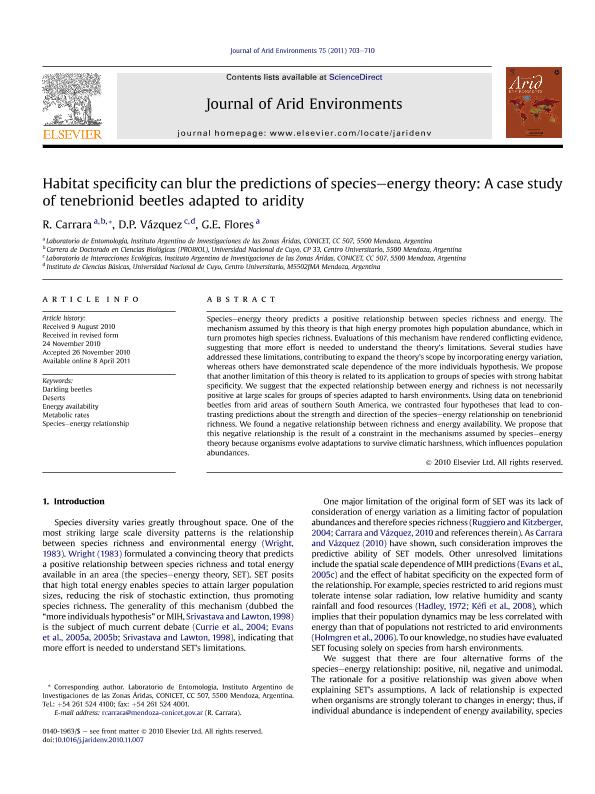Artículo
Habitat specificity can blur the predictions of species-energy theory: A case study of tenebrionid beetles adapted to aridity
Fecha de publicación:
08/2011
Editorial:
Academic Press Ltd - Elsevier Science Ltd
Revista:
Journal of Arid Environments
ISSN:
0140-1963
Idioma:
Inglés
Tipo de recurso:
Artículo publicado
Clasificación temática:
Resumen
Species-energy theory predicts a positive relationship between species richness and energy. The mechanism assumed by this theory is that high energy promotes high population abundance, which in turn promotes high species richness. Evaluations of this mechanism have rendered conflicting evidence, suggesting that more effort is needed to understand the theory's limitations. Several studies have addressed these limitations, contributing to expand the theory's scope by incorporating energy variation, whereas others have demonstrated scale dependence of the more individuals hypothesis. We propose that another limitation of this theory is related to its application to groups of species with strong habitat specificity. We suggest that the expected relationship between energy and richness is not necessarily positive at large scales for groups of species adapted to harsh environments. Using data on tenebrionid beetles from arid areas of southern South America, we contrasted four hypotheses that lead to contrasting predictions about the strength and direction of the species-energy relationship on tenebrionid richness. We found a negative relationship between richness and energy availability. We propose that this negative relationship is the result of a constraint in the mechanisms assumed by species-energy theory because organisms evolve adaptations to survive climatic harshness, which influences population abundances.
Archivos asociados
Licencia
Identificadores
Colecciones
Articulos(IADIZA)
Articulos de INST. ARG DE INVEST. DE LAS ZONAS ARIDAS
Articulos de INST. ARG DE INVEST. DE LAS ZONAS ARIDAS
Citación
Carrara, Rodolfo; Vazquez, Diego P.; Flores, Gustavo Ernesto; Habitat specificity can blur the predictions of species-energy theory: A case study of tenebrionid beetles adapted to aridity; Academic Press Ltd - Elsevier Science Ltd; Journal of Arid Environments; 75; 8; 8-2011; 703-710
Compartir
Altmétricas




